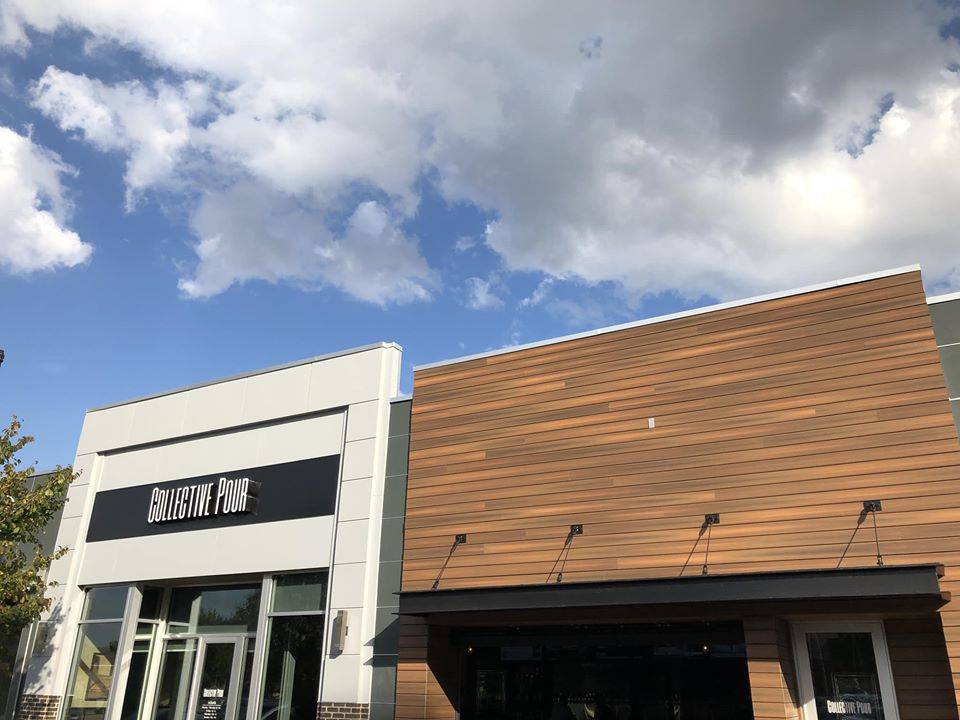Collective Pour’s passion for craft beer overflows and spills into the community as a local bar meant to strengthen both the love for beer and the roots its established in Champaign. I had the opportunity to interview Samir Naik, owner of Collective Pour, over the phone (social distancing) to talk more about the intricacies of craft beer and the thirst for knowledge about breweries and flavors.
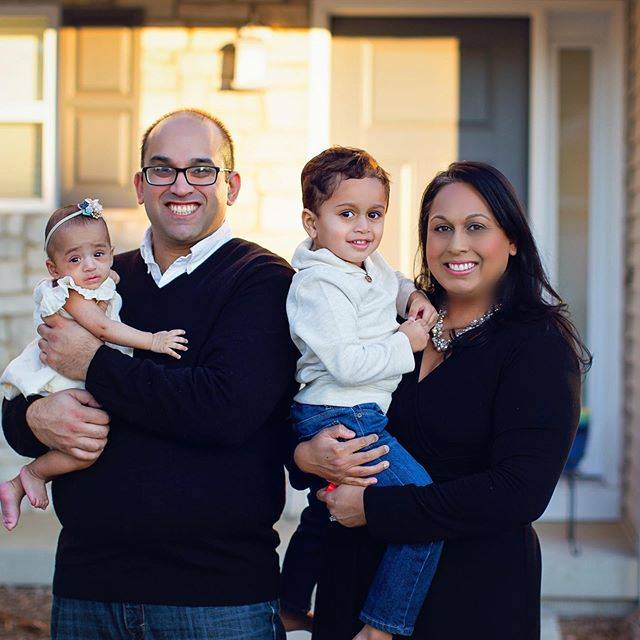
Owner Samir Naik with his wife and children. Photo by Collective Pour.
Smile Politely: What inspired you to establish Collective Pour?
Samir Naik: A lot of things. I was born and raised in the hospitality business. My parents immigrated from India. They lived in California, moved, and followed opportunity to Champaign-Urbana in 1979 — and made it home. I was born in Champaign. With my parents in the hotel business, I managed my family’s hotels. When we were in Danville and my parents (because of illnesses and stuff) were wanting to get out, I helped them wrap up their businesses.
When my wife and I got married, she asked me, “What do you want to do after the hotel business?” I knew I wanted to do hospitality. That’s one thing I was never going to leave. I mean, I grew up in it; I spent my whole life in it. That’s something that you just don’t say, “Hey, I’m done with it.”
So we took a trip down to Florida back in 2014, and we hung out at a craft beer bar. I was like, “This is cool. I like this! I love how it’s an unpretentious place.” I asked a few questions, and they found me a beer — beer that I’ve never had — and I was like, “Wow. This is something I like.” Then after, my wife and I took trips to beer bars, whiskey bars, taprooms. We just love the feel: how you can walk into a place, ask a few questions, and you’re introduced to something you’ve never tried before. So that was what drove me to create Collective Pour: an unpretentious, low-key place where you can go in and just try beer. Pick my staff’s brain, try different stuff, pick my brain. It doesn’t even have to be beer: it could be whiskey; it could be cocktails. Just a place to go in, have fun, and chill.
SP: Is that community aspect really important to Collective Pour? Would you say it has become that place with that community feel?
Naik: Yes, it is because we have community tables. We have four long ten-foot tables. Our bar is 40 feet long. The great part is we’ve got such great customers like regulars, loyal fans: they’re in here every few days. When I say it’s a community, it is that. People will be drinking a beer during happy hour, and someone asks, “Hey, how’s that beer?” to the bartender. Best part is a customer will jump in and say, “Hey, I just had that beer the other day; it’s fantastic. This is what it tastes like.” That’s what we want. We want a place where people engage. I’ve been to so many bars and taprooms and stuff where you’re just shelled off, like people don’t talk with each other, and it’s not a place where you can just go hang out and talk with strangers, and so that’s what Collective Pour has become and that’s what we wanted it to be.
SP: Did you have any historical or previous interest in craft beers before your Florida trip? What’s your history with it?
Naik: It’s unique. If you asked me what was the first beer I ever had, it was like McUltra, Bud Light; throw some limes in it, and call it a beer. I drank a lot of scotch and macrobeers. And then I met my wife in 2010. We did a long distance thing; she grew up in Central Florida in Orlando, so I went down there probably on our second or third date. She asked me if I’d ever had Cigar City, and I was like, “Wait, what’s Cigar City?” And that was the first craft beer I’d ever had back in 2010. We sat, and I tried beers. That’s what started my love affair with craft beer.
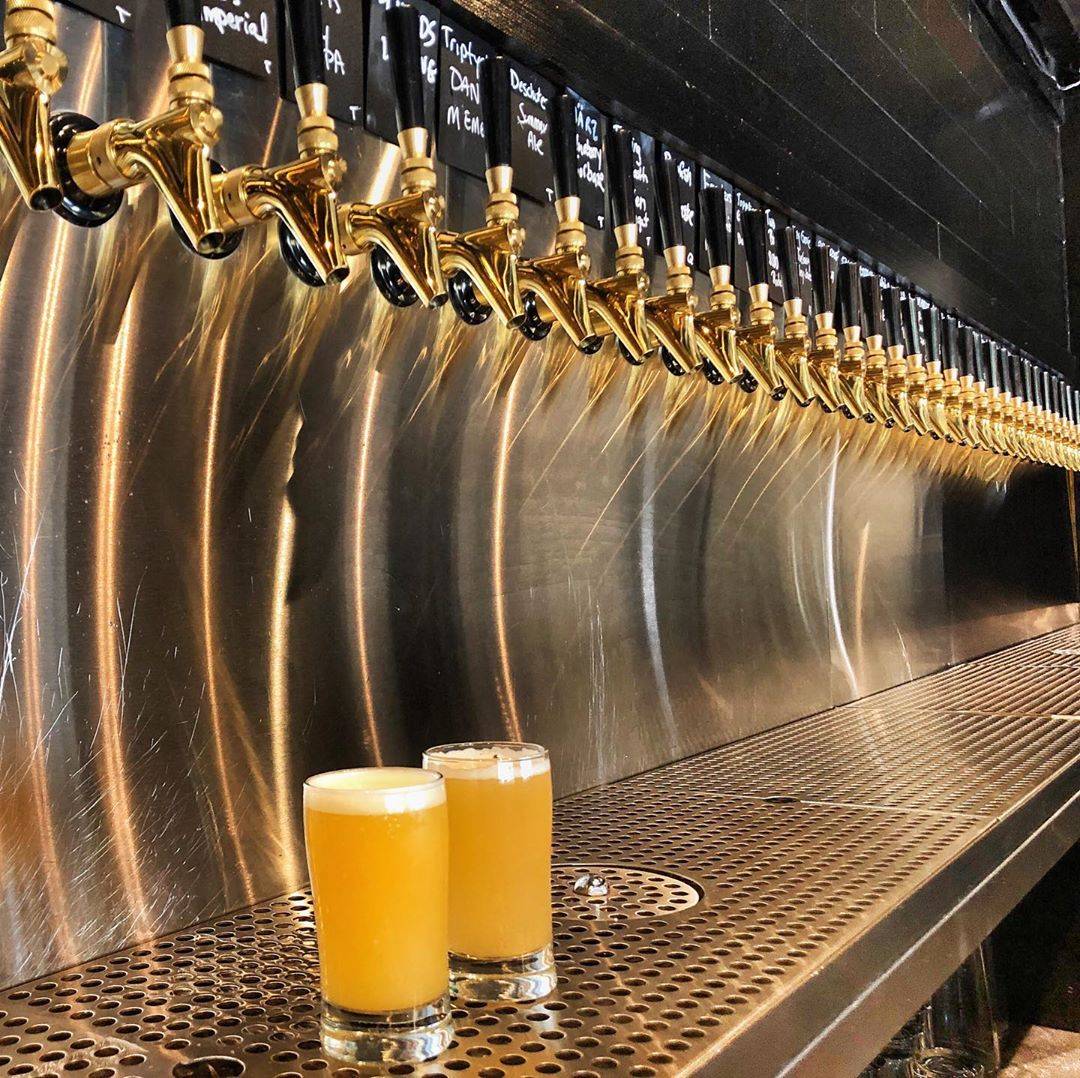
Photo by Collective Pour.
SP: You said you operate the business mostly by yourself, right?
Naik: After this pandemic, yes. It is only me right now, but when we’re in full operation, we’ve got three bartenders, kitchen staff, and support staff. I actively own, operate, and manage. We’re a family business, so every penny counts at this point. When the pandemic hit and all the closures came, I became a one man show.
SP: When you first started, was it also a one man show, or how was it beginning your business?
Naik: When we first opened, we did have staff. We had bartenders, and I have never been in the bar business. I had a business background and hospitality background, but I’d never made a cocktail. I mean, the only thing I ever made was an old-fashioned and a Manhattan because I love whiskey. So, I learned. We have a really good staff, a really good team, and we’ve kind of built a culture here of being family.
SP: Since you said that you weren’t in the bar business before, what did you do before Collective Pour?
Naik: I managed and operated my family’s hotels in Danville for 13 years. I remember at age 12 helping my parents. My dad had just started his first franchise hotel, and just as a family business, it’s all hands on deck. That’s how we treat Collective Pour. My wife still has a full-time job, and we have two very young kids — and it is a full time job. She helps me and gives me ideas. She brings a different perspective to things where I’m here all day, every day. She sees it on the outside as a consumer, so we work as a team. She’s just great support: she’s been there since day one, even when I was in my hotels. She always was the driving force to make me better.
SP: What would be an example of a way to get people to come to Collective Pour? Is it mostly word-of-mouth, is it advertising?
Naik: It’s word-of-mouth, the experience, focusing on quality versus quantity. We’ve never wanted to be the bar that serves 200 beers in an hour, like that’s not our goal. Our goal is for everyone to come in and have an experience and see what we’re about. Customer service is very important to me, and each person’s experience is very important to me.
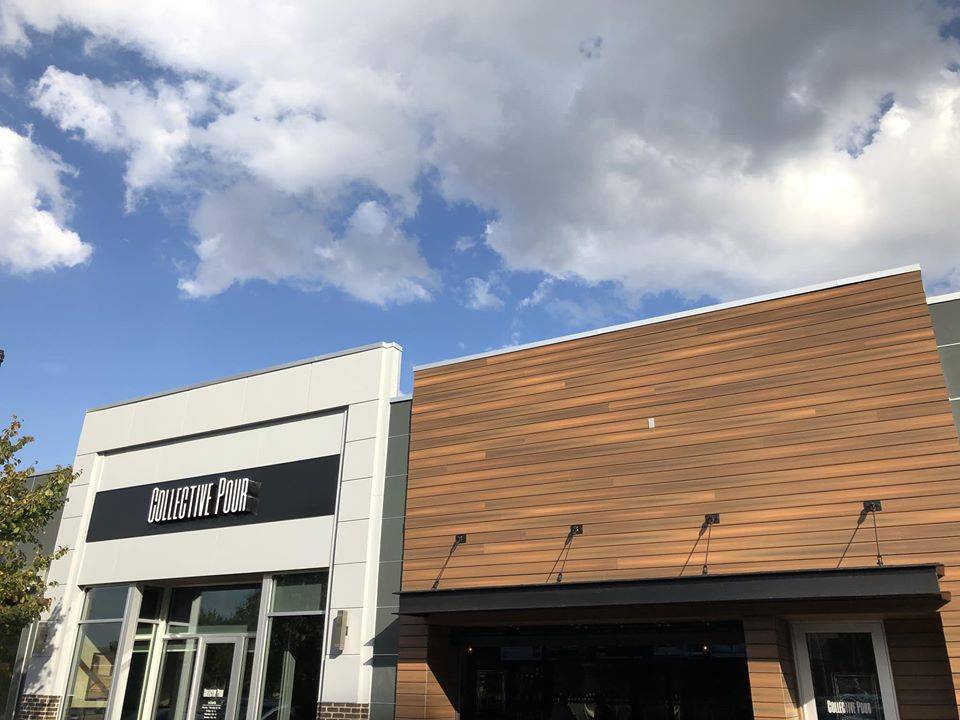
Photo by Collective Pour.
SP: Why did you choose your location to be in Champaign?
Naik: Easy: it’s home. I spent my whole life here. I was born in Champaign, at Carle. My kids were born at Carle, and my parents lived in Danville. My wife works here in town as a financial advisor. It’s home. You can’t start a business outside of home.
SP: With your home base being in Champaign, do you have plans for expanding into other cities?
Naik: I have no plans to expand, honestly. Collective Pour is my third child. Maybe ten years down the road, something comes up, maybe we will grow, but for the next ten years, no, I don’t see myself expanding. I want to see Collective Pour become a part of the community and a place where you say, “Hey, let’s go get a bite to eat. I want to get a drink, or get a beer to-go.” It should be Collective Pour. That’s what I want it to be.
SP: So it’s kind of growing that community feel and making it a staple place in Champaign?
Naik: Yeah, we want to be a staple. This is me pursuing my dream. I’ve always wanted to own my own business, and unfortunately given the circumstances right now, it’s making it really hard. To see it grow is the most satisfying thing, to see people in here regularly.
The best thing with this pandemic, this closure we’re in right now, is my regulars come in and just say, “Hey how are you doing?” We were closed Thursday, for example, because my daughter just turned one. She was given really terrible odds when she was born; she was born three months premature. We had a great staff that helped me last May. Some regulars that were there around when she was born said to me, “You look like a hot mess.” I was like, “This is kind of what I’m going through.” Then they’d ask me every week, every two weeks, “How’s your daughter? How’s your family?” That’s community. That is why I love Champaign. We’re a big city but with a small town feel.
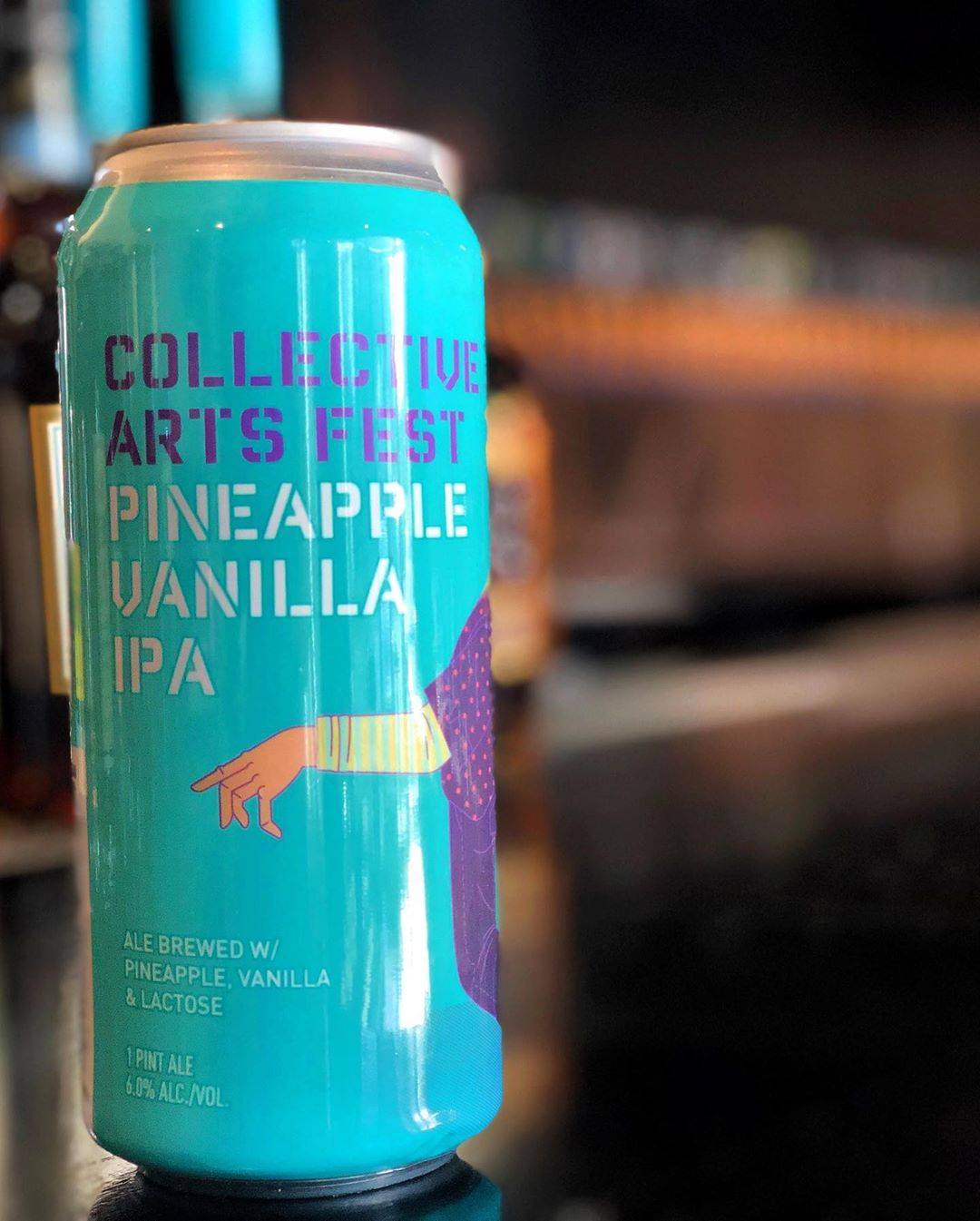
SP: What are among your favorites of the craft beers you have?
Naik: We have so many. We have 60 drafts, and we have more in package because certain beers don’t come on draft. They don’t come in kegs. Brewers just sometimes want to push that is a package-only, so cans or bottles. With 60 drafts, I can’t really have one favorite. I love my stout porters. Some of the recent favorites are one-time cans of outer range IPAs. They’re out of Frisco, Colorado. Really well done IPAs, really put together, very balanced. The other one is Firestone Walker: a bretta blanc which is a sour. It’s a beer based on white wine which is very unique. They take grape juice, add beer malt, blend it, and then introduce a sauvignon blanc yeast. The beer is a little bit tart, refreshing, but it has notes of white wine.
SP: Does that mean most of your beers aren’t just from local breweries?
Naik: We try to be as diverse as possible. We do carry our Champaign County breweries. They do some really solid beers, but we also want to focus on great breweries from across the Midwest. We’re very fortunate to live in this “Triangle,” as I call it: Indiana, Chicago, St. Louis, and all those breweries in between. To me, local is Illinois because we have so many great breweries in this state. We’re also bringing in beers from the East Coast, West Coast, and Colorado.
SP: On your website, you say that every beer has a unique story. Which of the beers would you say has the most interesting story?
Naik: One is Collective Arts. They’re a craft brewer out of Ontario, Canada. All the artwork on their cans is from individual artists, and the beer is driven by that, like the style of beers, how they’re making their beers, what they want it to be. So it’s like an art. The second one is from Little Beaver, a good partner of ours over in Bloomington, Normal. One of their beer lines that’s been a favorite here at Collective Pour is called Wainbows. The brewer’s kids can’t say rainbows, so it’s “wainbows.” The beers are usually fruity, over-fruited, and it’s always been great.
SP: Are there a few staple ones that you always keep on tap?
Naik: We have one form of a blonde ale, some form of a lager, a kolsch, a pilsner, one West Coast style IPA, something from Revolution, and something from Firestone Walker. Those are our staples.
SP: Can you detail a little bit more about Collective Pour’s spirits and wine?
Naik: All our spirits are hand-selected by me. I don’t want to have the largest liquor shelf; there’s no fun behind that. I want to have spirits carefully picked, same thing with our beer. Our beer is hand-picked. We want to focus on quality, but at the same time, we don’t want to have the most expensive product sitting on the shelf. We want to highlight whiskeys with a great story behind it.
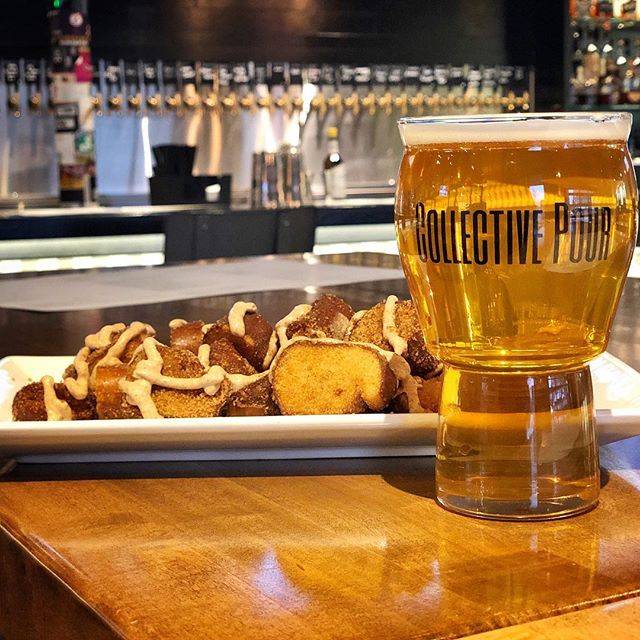
Photo by Collective Pour.
SP: What category of cuisine does the food do you serve fit in?
Naik: It’s a high-quality bar snack. It’s shareable, but you can easily make it into a meal if you wanted to. When we made our menu, I wanted to make sure we didn’t inundate people with a ton of items because we have so many things on our beer line, our whiskey line, cocktails, and our wines, in general.
A nacho is a nacho; a pretzel is a pretzel. We want people to know what they’re going to get, and we want it to be easy for people to make a decision. If I’m enjoying a beer, I don’t want to sit there and look through a menu with a ton of items. All our meats are prepped in house. Our chicken tenders aren’t frozen; we literally brine it with beer from our draft line: spice it, brine it for hours, and fry. Our pulled pork is done in house. Same with our hand-cut fries: we make them in house. For our cheese curds, we don’t make the cheese, but we batter them fresh and fry fresh.
SP: What goes into determining what a good beer is?
Naik: One thing that I tell people is that a good beer to me may be a bad beer to you, so I don’t put my personal favorites on tap because my personal favorites may not be your favorite. We try to be as diverse as possible in our choices, but a good beer is always supposed to be balanced. If it’s an IPA, it has to be balanced. If you tell someone it’s a mango, vanilla, pineapple IPA, you have to make sure you’re hitting all those points.
SP: We kind of talked a little bit about how you’re dealing with the pandemic and the quarantine, but since you say it’s a one-man show now, how has that been affecting you and your business in general?
Naik: I mean, we are doing five to ten percent of what we normally do. To be honest with you, we’re in survival mode. There’s no rosy picture to paint. We can’t survive in this form much longer. We need definition; we need a roadmap. At the same time, we want to take in the consideration of the team, my family, and our guests. We want to make sure everyone’s safe. We’re a family business. I put my entire life savings into this. I’m doing everything from curbside to in-person ordering to making deliveries myself. It’s survival.
SP: Do your regulars still come in? As you said, it seems like they’ve been pretty supportive.
Naik: They’ve been very supportive. It’s funny as I’ve seen my regulars more now than I did in the past. It’s fun; I enjoy it. It’s words of encouragement, and people coming in: it keeps me going. If I dwell on the numbers side of the business, I’d never get out of bed. The great people we have, the great community, and the focus on local is very important right now. Most of our regulars are supporting us right now, and I can’t say thank you enough for that.
Collective Pour
340 N Neil St
Champaign
M-F 3 to 5:30 p.m.
Sa + Su noon to 2:30 p.m.








